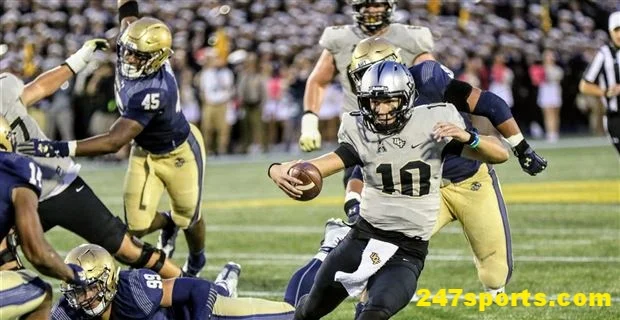Note: Don't buy into all the returning starter chatter in college football
It's finally projection season in the college football world, which means games aren't far away. One of the big narratives every year during this time of the year, is returning starters and returning production.
Let me make this very clear - returning starters matter, but you have to be careful with this stat and understand it for what it is, because it is not an end all be all to projecting your favorite teams win totals.
Yes it matters, but how much does it matter? If you cook a dinner tonight and burn most of it and don't eat it, throw it in the refrigerator to eat tomorrow - yes you are eating left overs and a full 100 percent meal, but it's crap.
The big question is what do you actually have returning? Is your meal eloquent or is it straight crap?
Phil Steele recently released his top ten of teams with returning starters, and several months ago, Bill Connelly did a great piece you can read right here as he ranks all 130 division one teams on returning production.
Again, you cannot, CANNOT look at your team and say, "hey we have 18 returning starters; we goin bowlin baby!!", that's not how any of this works. You have to dig deeper than that and a great place to do that is right here on the Hour Glass. Just how good is your talent returning? How good is your returning quarterback and is your coach competent enough to take that returning production and make it really produce?
We took Bill Connely's top 25 returning production for 2018, and show you their record a year ago, what we project for 2018 and their talent rank on our metric. You should find these numbers intriguing.
We found some interesting numbers in looking at this. First off, 44 percent of the top 25 returning productions teams project to have better seasons than a year ago; but only Baylor and Florida project to have major turn arounds. The rest either project at most two games better than a year ago, or to get worse, or stay even Steven. Those highlighted have a lot in common. High recruiting rankings nationally, or in their conference, good quarterback play returning or coaching.
Look, Kansas is number two on the list, but nobody is laying any money on Kansas to compete for the Big 12 this year. The same can be said for Ball State, Charlotte and others.
What you have to look at is the quality. Michigan State is number one in the country in returning production, but that talent is the 27th best talent in the nation. They also have an above average coach in Mark Dantonio and a solid quarterback in Brian Lewerke. We have them projected to finish as last year, at 9-3. So the numbers work for the Spartans, but you have to look at the overall picture.
Mississippi State is another team, ranked 8th in returning production. But, they have a high level quarterback and a new head coach that projects above average.
Phil Steele said Florida was his bounce back team in 2018, and I can go with that because the Gators could have a major swing from 4-8 to 8-4, and return 75 percent of their starters. That talent base is 14th nationally and they have an above average coach in Dan Mullen. Their biggest question is quarterback.
But this doesn't work for a team like Arizona. They have the 47th best talent roster in the country, and while they return 75 percent, they are the 10th most talented team in the PAC 12. Yes they return a really good quarterback in Khalil Tate and Kevin Sumlin should help that talent rank in the future, but 6-6 is about as good as this team will be in 2018.
We can even look at the inverse of this entire conversation and go the other way to prove you don't just take returning production to project.
Oklahoma returns 55 percent of their starters, good enough for 97th nationally; Alabama ranks 102nd with 62% and Georgia at 71 with 66%. Are any of you projecting these three teams to go 5-7?
Well of course not, because they have elite talent across the board.
Starters matter, but the talent matters more. You have to look at the entire picture or you will be left scratching your head wondering where your predictions went wrong.
When you get to that point, come back here and continue to let us teach you a thing or two.









